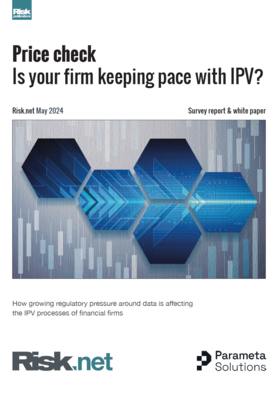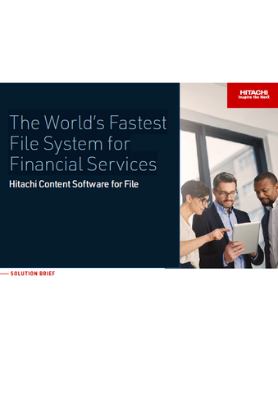Price check: Is your firm keeping pace with IPV?

Independent price verification (IPV) and valuation control are key requirements of financial firms’ compliance, risk management and reporting activities. But the growing complexity of financial markets and patchy liquidity means regulators and auditors increasingly expect firms to source more granular data for these processes.
As a result, demand for alternative sources to support more accurate price verification, coupled with a rise in data quality due to stricter financial regulations, means broker data is becoming a more viable option for many banks.
This Risk.net survey report, commissioned by Parameta Solutions, explores how valuation control and risk specialists at investment banks and other sell-side firms are tackling the challenges of the IPV and valuation process, addressing concerns about data quality and shoring up their IPV strategies to squeeze more value from their investments.
“The valuation control function is not merely a ‘Ctrl+F9’ job or the execution of a predefined, rigid process,” one global bank interviewee said. “[It requires] judgment, understanding of the context and the business, and the ability to connect multiple dots to arrive at a sensible and balanced judgment.”
Download the whitepaper
Register for free access to hundreds of resources. Already registered? Sign in here.
More related resources
Deploy a scalable distributed file system — rapidly, easily and affordably
Eliminate the complexity, cost and delays of configuring a distributed file system from multiple components and manufacturers. Hitachi Content Software for File lets you design and deploy a leading edge file system — now.
High-Performance Storage for AI and ML
It’s a highly complex question with a deceptively simple answer: How do you win with artificial intelligence, machine learning, and high-performance, computing-based analytics? Speed.

The World’s Fastest File System for Financial Services
Speed. Agility. Storage. In financial services, the need has never been greater.

The Emir Refit Playbook
The upcoming Emir Refit regulation, set to enter the European Union’s statute books in
the first half of 2024, is different in substance to the regulations preceding it, although
the implications of complying with it are similar: firms will need to understand the
required adjustments to their current reporting workflows and underlying technology to
allow them to manage their trade/transaction reporting efficiently and transparently in
the new dispensation.
APAC Buy-Side Firms Embrace Alt Data and the Cloud
This paper comprises three sections: respondents’ demographics, alternative data and the cloud.
